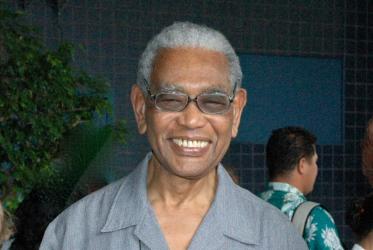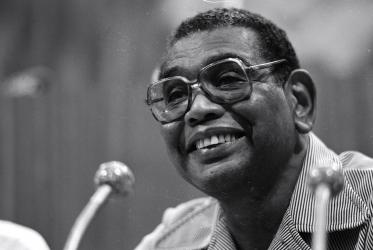Geneva, August 17, 2021
Dear Bishop Wartenberg-Potter,
On the 100th anniversary of your husband’s birth on 19 August 1921, I am writing on behalf of the World Council of Churches to express our recognition and appreciation of Philip Potter’s life and contribution to the ecumenical movement.
Philip Potter’s influence extended well beyond his 12 years as WCC general secretary from 1972 to 1984. From the WCC’s founding assembly in 1948 where he addressed the assembly on behalf of the youth delegates, through his work as a staff member in the WCC youth department and later as director of the Commission on World Mission and Evangelism before he became WCC general secretary, Philip Potter was a pivotal figure in the ecumenical movement, and remained so after concluding his mandate as general secretary.
My most striking memory of Philip Potter is from the WCC’s assembly in Harare in 1998 when, with South African President Nelson Mandela, he addressed the celebrations to mark the WCC’s 50th jubilee. He recalled how the WCC’s 1st Assembly in Amsterdam in 1948 had inspired him and other young delegates there with its declaration to oppose terror, cruelty, and race discrimination.
Philip Potter became WCC general secretary at a time of a time of global religious and socio-political change, when the WCC itself was expanding from being a largely European and North American grouping to a genuinely worldwide fellowship. The first WCC general secretary from the global South, he provided decisive leadership to the council in this time of change, which drew upon his deep spirituality, and his Christian faith, and for this we give thanks to God.
We remember with gratitude Philip Potter’s uncompromising stand against racism, often in the face of vigorous criticism from some of the council’s larger member churches. His legacy is a continuing mandate for us today, where recent events have underlined just how much the scourge of racism remains a challenge to the world and to the global Christian fellowship.
Equally, we remember how he helped the ecumenical fellowship develop a truly global understanding of mission, his commitment to dialogue with people of other faiths, to the unity of the church, and to concerns of church and society.
We look back with thankfulness to Philip Potter’s commitment from his earliest days in the ecumenical movement to encouraging youth to play a full role in church and society. This was seen in his involvement in and leadership of the World Student Christian Federation – and we remember his visit with you to Geneva in 2009 to support the launch of the WSCF’s Philip Potter Fund to encourage ecumenical leadership formation.
We particularly remember Philip Potter’s unceasing support for women in leadership positions in the WCC, his statement in 1974 that “sexism, like racism, is a sin,” and the leadership that led to the study and world conference on the Community of Women and Men in the Church.
Above all, however, we remember Philip Potter’s love for the Bible, and the biblical exposition that often formed the core of his reports to the WCC governing bodies. Many of us still remember his address to the WCC’s assembly in Vancouver on the church as a “House of Living Stones.”
We still draw inspiration from this address, where he underlined that only as the churches relate to each other as living stones will they discover new realities about their essential calling to be the house of the triune God, and their calling to be a fellowship of confessing, learning, participating, sharing, healing, reconciliation, unity, and expectancy.
Dear Bishop Wartenberg-Potter, anniversaries are often occasions of mixed emotions. While we remember and draw inspiration from Philip Potter’s life and work, we are also aware just how much his presence is lacking, and that you probably feel this loss strongly and painfully at this time.
May the love of the triune God revealed in Christ accompany you in these days.
Rev. Prof. Dr. Ioan Sauca
Acting General Secretary
World Council of Churches



